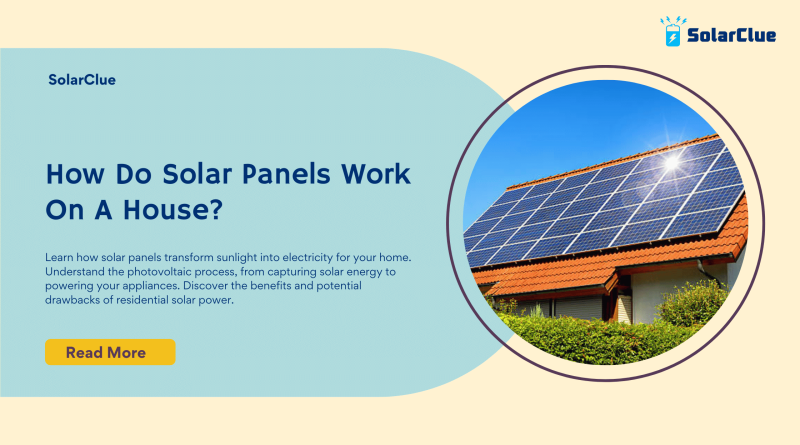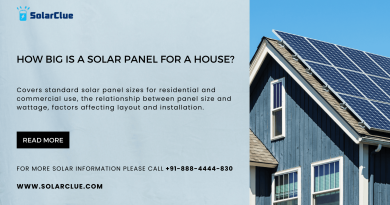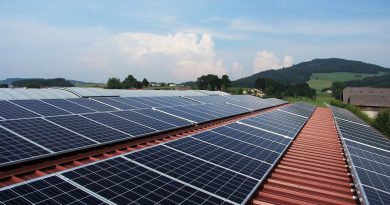How Do Solar Panels Work On A House?
Solar energy is a sustainable and increasingly popular way to power homes. Understanding how solar panels work and how they are integrated into residential systems is crucial for homeowners considering this renewable energy source. This blog explains the science behind solar panels, the components of a residential solar system, installation and maintenance, net metering, battery storage, maximizing energy production, common misconceptions, and the future of residential solar energy.
Table of Contents
- 1 The Science Behind Solar Panels
- 1.1 The Photovoltaic Effect
- 1.2 Role of Solar Cells
- 1.3 Solar Panels
- 1.4 Inverter
- 1.5 Mounting Hardware
- 1.6 Solar Panel Installation and Maintenance
- 1.7 Installation Process
- 1.8 Maintenance Tips
- 1.9 Installation and Maintenance Table
- 1.10 Net Metering and Grid Integration
- 1.11 Net Metering
- 1.12 Grid Integration
- 1.13 Net Metering and Grid Integration Table
- 1.14 Battery Storage for Solar Energy
- 1.15 Importance of Battery Storage
- 1.16 Types of Batteries
- 2 Maximizing Energy Production from Solar Panels
The Science Behind Solar Panels
The Photovoltaic Effect
Solar panels generate electricity through the photovoltaic (PV) effect, a process that converts sunlight directly into electricity. When sunlight strikes the solar cells in a panel, it excites electrons, creating an electric current.
Role of Solar Cells
Solar cells, typically made of silicon, are the building blocks of solar panels. They absorb sunlight and release electrons, which flow through the cell and generate an electric current.
| Factor | Description |
|---|---|
| Sunlight | Source of energy that excites electrons in solar cells. |
| Silicon Cells | Material used in most solar cells due to its semiconducting properties. |
| Electron Excitation | Process where sunlight energy releases electrons in silicon cells, creating an electric current. |
| Electric Current | Flow of electrons generated by the photovoltaic effect, providing usable electricity. |
Components of a Residential Solar System
Solar Panels
The Solar panels are composed of multiple solar cells connected together to capture sunlight and convert it into electricity.
Inverter
The inverter converts the direct current (DC) produced by solar panels into alternating current (AC), which is used by most home appliances.
Mounting Hardware
This secures the solar panels to the roof or ground, ensuring they are positioned correctly for maximum sunlight exposure.
| Component | Description |
|---|---|
| Solar Panels | Capture sunlight and convert it into DC electricity. |
| Inverter | Converts DC electricity from panels into AC electricity for home use. |
| Mounting Hardware | Secures panels in optimal positions on the roof or ground. |
| Battery Storage | (If applicable) Stores excess energy for use when sunlight is not available. |
Solar Panel Installation and Maintenance
Installation Process
Proper installation is crucial for the efficiency and longevity of a solar panel system. This includes site assessment, design, permitting, installation, and inspection.
Maintenance Tips
Solar panels require minimal maintenance, primarily cleaning to remove dust and debris and periodic inspections to ensure all components are functioning correctly.
Installation and Maintenance Table
| Step | Description |
|---|---|
| Site Assessment | Evaluates roof condition, orientation, and shading. |
| System Design | Customizes the solar panel system based on energy needs and site conditions. |
| Permitting | Secures necessary permits from local authorities. |
| Installation | Installs panels, inverters, and other components. |
| Inspection | Ensures the system meets safety and performance standards. |
| Cleaning | Periodically remove dust and debris from panels. |
| Inspections | Regularly check system components for optimal performance. |
Net Metering and Grid Integration
Net Metering
As Net metering allows homeowners to receive credit for excess electricity their solar panels generate and feed back into the grid. This helps offset the cost of electricity drawn from the grid when solar production is low.
Grid Integration
Solar systems can be integrated with the grid to ensure a continuous power supply. During peak sunlight hours, excess energy is sent to the grid, and during low sunlight periods, energy is drawn from the grid.
Net Metering and Grid Integration Table
| Concept | Description |
|---|---|
| Net Metering | Credits homeowners for excess electricity fed into the grid, reducing overall energy costs. |
| Grid Integration | Connects solar systems to the grid for a reliable power supply and efficient energy management. |
| Energy Credit | Value given for excess energy, used to offset future electricity bills. |
Battery Storage for Solar Energy
Importance of Battery Storage
Battery storage systems store excess solar energy generated during the day for use at night or during power outages, providing energy independence and reliability.
Types of Batteries
Common types of batteries used in solar systems include lithium-ion, lead-acid, and flow batteries, each with its own advantages and disadvantages.
| Battery Type | Advantages | Disadvantages |
|---|---|---|
| Lithium-Ion | High efficiency, long lifespan, compact size | Higher cost |
| Lead-Acid | Lower cost, proven technology | Shorter lifespan, lower efficiency |
| Flow Batteries | Long lifespan, scalable capacity | Large size, higher initial cost |
Maximizing Energy Production from Solar Panels
Panel Orientation and Tilt
Optimal panel orientation and tilt are crucial for maximizing energy production. Panels should face south in the Northern Hemisphere and be tilted at an angle equal to the latitude of the location.
Reducing Shading
Minimizing shading from trees, buildings, and other obstructions increases the efficiency of solar panels.
| Factor | Description |
|---|---|
| Orientation | Panels should face south in the Northern Hemisphere for maximum sunlight exposure. |
| Tilt Angle | Panels should be tilted at an angle equal to the latitude of the location. |
| Shading | Minimizing shading from obstructions ensures higher efficiency. |
| Cleaning | Regularly clean panels to remove dust and debris. |
Common Misconceptions About Solar Power
Misconception 1: Solar Panels Don’t Work in Cloudy Weather
Fact: Solar panels can still generate electricity on cloudy days, although at reduced efficiency.
Misconception 2: Solar Panels Are Too Expensive
Fact: While the initial investment can be high, government incentives and long-term savings make solar panels cost-effective.
| Misconception | Fact |
|---|---|
| Solar Panels Don’t Work in Cloudy Weather | Panels can generate electricity on cloudy days, though at reduced efficiency. |
| Solar Panels Are Too Expensive | Initial costs are offset by government incentives and long-term energy savings. |
| Solar Panels Require Constant Maintenance | Panels require minimal maintenance, mainly cleaning and periodic inspections. |
| Solar Energy Isn’t Reliable | With battery storage and grid integration, solar energy provides a reliable power source. |
The Future of Residential Solar Energy
Advances in Technology
Advances in solar technology, such as higher efficiency panels and better storage solutions, will continue to improve the viability of residential solar energy.
Government Policies
Supportive government policies and incentives will drive the adoption of residential solar energy, making it more accessible to homeowners.
| Aspect | Description |
|---|---|
| Technological Advances | Improved efficiency, better storage solutions, and innovative technologies. |
| Government Policies | Continued support and incentives to make solar energy more accessible and affordable. |
| Market Growth | Increasing demand and market expansion for residential solar systems. |
| Sustainability Goals | Solar energy contributing to global sustainability and reducing carbon footprints. |
Conclusion
Solar panels are an effective way to generate electricity for homes, offering sustainability and potential cost savings. Understanding the science, components, installation, and maintenance of solar systems, along with the benefits of net metering and battery storage, can help homeowners make informed decisions. With ongoing advancements and supportive policies, the future of residential solar energy looks promising.
Here at SolarClue®, we offer a smart, practical, and “beautiful” solution. You will be answered for all the questions related to Solar.
We provide all kinds of brands that are the Best Solar panels in India.
If you are the one who is planning for the solar power system. Don’t hesitate to contact our team!
Looking forward to empowering you with solar energy, just like hundreds of our other clients!
FAQs
1. How do solar panels work?
Solar panels convert sunlight into electricity through the photovoltaic effect, using solar cells.
2. What are the main components of a solar panel system?
The main components are solar panels, inverters, and mounting hardware.
3. What is net metering?
Net metering allows homeowners to receive credit for excess electricity their solar panels generate and feed back into the grid.
4. Do solar panels work during cloudy weather?
Yes, solar panels can still generate electricity on cloudy days, though at reduced efficiency.
5. How often do solar panels need maintenance?
Solar panels require minimal maintenance, primarily regular cleaning and periodic inspections.




